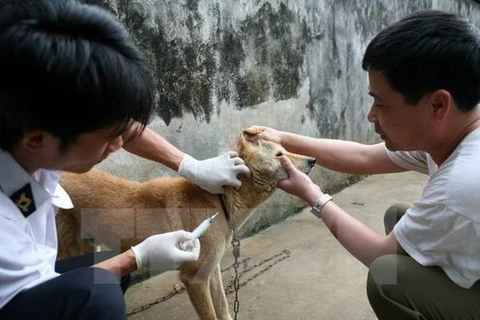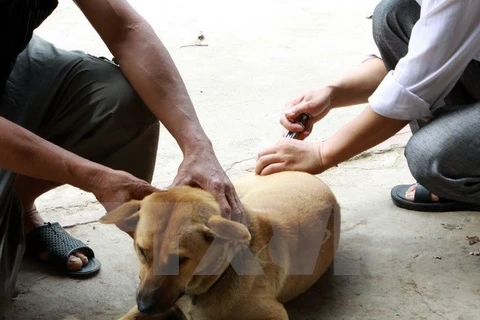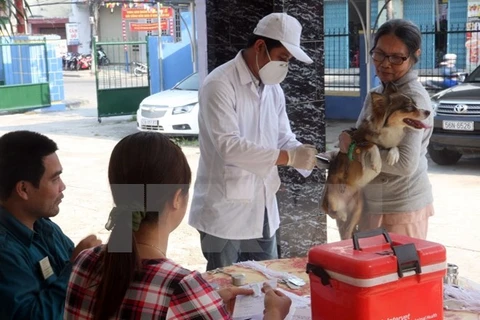Hanoi (VNA) - Although the Hanoi People’s Committee has recently tightened dog management by asking dog owners to register their pets, the vast majority of people have remained unaware of the policy.
According to the national blueprint on prevention and elimination of rabies in the period between 2018 and 2021, the local authorities request dogs to be registered, leashed or kept in owners’ living spaces and muzzled when playing in public areas. Dog owners have to pay fines when their off-leash dogs are seized by law enforcement. If off-leash dogs bite people, their owners must pay for the victims’ medical needs.
However, the policy has caught little attention of dog owners as dogs are still allowed to run off leash without muzzles and defecate on streets. The situation is more common in Hanoi’s suburban districts.
Pham Quoc Thang, director of TS Milan, a Vietnamese national standard dog farm, told Thanh Nien (Young People) Newspaper that he knew nothing about the new regulation.
“Professional dog trainers mostly register for certificates of breeds for their dogs. These dogs are also microchipped for management,” he said.
He also stressed the significance of leashing and wearing muzzles for dogs to protect pets and humans.
Lan Khue, a dog owner in Nhat Tan, Tay Ho district, had never heard of dog registration. However, Khue said that she would comply with the new regulation.
On the other hand, many people find it troublesome registering their pets.
“I have raised dogs for some decades and they are all friendly. Since I already give them rabies vaccinations annually, I think that to have dogs registered is unnecessary and a waste of time. I wonder how the authorities will manage dogs. We have not done the registration and no one has asked us to do so,” he said.
Local authorities are struggling to implement the regulation.
“It is difficult to ask people to register their dogs, although we make a list of dog owners,” said Trinh Chi Thanh, head of the Buoi Ward People’s Committee in Tay Ho district.
Hoa Xuan Thuan, deputy head of the committee, said that the locality had established an interdisciplinary team to impose the regulation. No violations had been detected although dog faeces are still easily found on streets, Thuan added.
“Therefore, we mainly focus on raising awareness of dog owners about hygiene and safety for people and surroundings,” he said.
Nguyen Ngoc Son, head of the Hanoi Department of Veterinary issues, blamed local authorities for not strictly adopting the regulation. Therefore, dog owners have not paid enough attention to muzzling their dogs in public spaces, registering and cleaning after their pets.
The data collected by Hanoi’s district authorities shows that there are about 426,000 dogs and cats in Hanoi. Ninety percent of them are vaccinated and more than 90 percent of dog owners know and obey national policies against rabies.- VNA
According to the national blueprint on prevention and elimination of rabies in the period between 2018 and 2021, the local authorities request dogs to be registered, leashed or kept in owners’ living spaces and muzzled when playing in public areas. Dog owners have to pay fines when their off-leash dogs are seized by law enforcement. If off-leash dogs bite people, their owners must pay for the victims’ medical needs.
However, the policy has caught little attention of dog owners as dogs are still allowed to run off leash without muzzles and defecate on streets. The situation is more common in Hanoi’s suburban districts.
Pham Quoc Thang, director of TS Milan, a Vietnamese national standard dog farm, told Thanh Nien (Young People) Newspaper that he knew nothing about the new regulation.
“Professional dog trainers mostly register for certificates of breeds for their dogs. These dogs are also microchipped for management,” he said.
He also stressed the significance of leashing and wearing muzzles for dogs to protect pets and humans.
Lan Khue, a dog owner in Nhat Tan, Tay Ho district, had never heard of dog registration. However, Khue said that she would comply with the new regulation.
On the other hand, many people find it troublesome registering their pets.
“I have raised dogs for some decades and they are all friendly. Since I already give them rabies vaccinations annually, I think that to have dogs registered is unnecessary and a waste of time. I wonder how the authorities will manage dogs. We have not done the registration and no one has asked us to do so,” he said.
Local authorities are struggling to implement the regulation.
“It is difficult to ask people to register their dogs, although we make a list of dog owners,” said Trinh Chi Thanh, head of the Buoi Ward People’s Committee in Tay Ho district.
Hoa Xuan Thuan, deputy head of the committee, said that the locality had established an interdisciplinary team to impose the regulation. No violations had been detected although dog faeces are still easily found on streets, Thuan added.
“Therefore, we mainly focus on raising awareness of dog owners about hygiene and safety for people and surroundings,” he said.
Nguyen Ngoc Son, head of the Hanoi Department of Veterinary issues, blamed local authorities for not strictly adopting the regulation. Therefore, dog owners have not paid enough attention to muzzling their dogs in public spaces, registering and cleaning after their pets.
The data collected by Hanoi’s district authorities shows that there are about 426,000 dogs and cats in Hanoi. Ninety percent of them are vaccinated and more than 90 percent of dog owners know and obey national policies against rabies.- VNA
VNA

























